Reflective Writing Assignment: Bipolar Disorder and Nursing Care
VerifiedAdded on 2022/08/11
|8
|1764
|28
Report
AI Summary
This reflective writing assignment delves into the complexities of bipolar disorder and its implications for nursing practice. The student analyzes the case of Catherine Zeta-Jones, drawing insights from her experience with Bipolar II Disorder. The paper applies the five R's of reflection to explore how the case study has influenced the student's perspective on patient care and recovery strategies. It highlights the importance of mental strength, determination, and positive thinking in overcoming the challenges associated with bipolar disorder. Furthermore, the assignment discusses the therapeutic benefits of music and yoga therapy for patients, referencing existing studies and suggesting the integration of these methods in healthcare settings to promote spiritual upliftment and a positive healing environment. The student emphasizes the need for nurses to build supportive relationships with patients, encouraging and assisting them in managing their mental stress and depression.
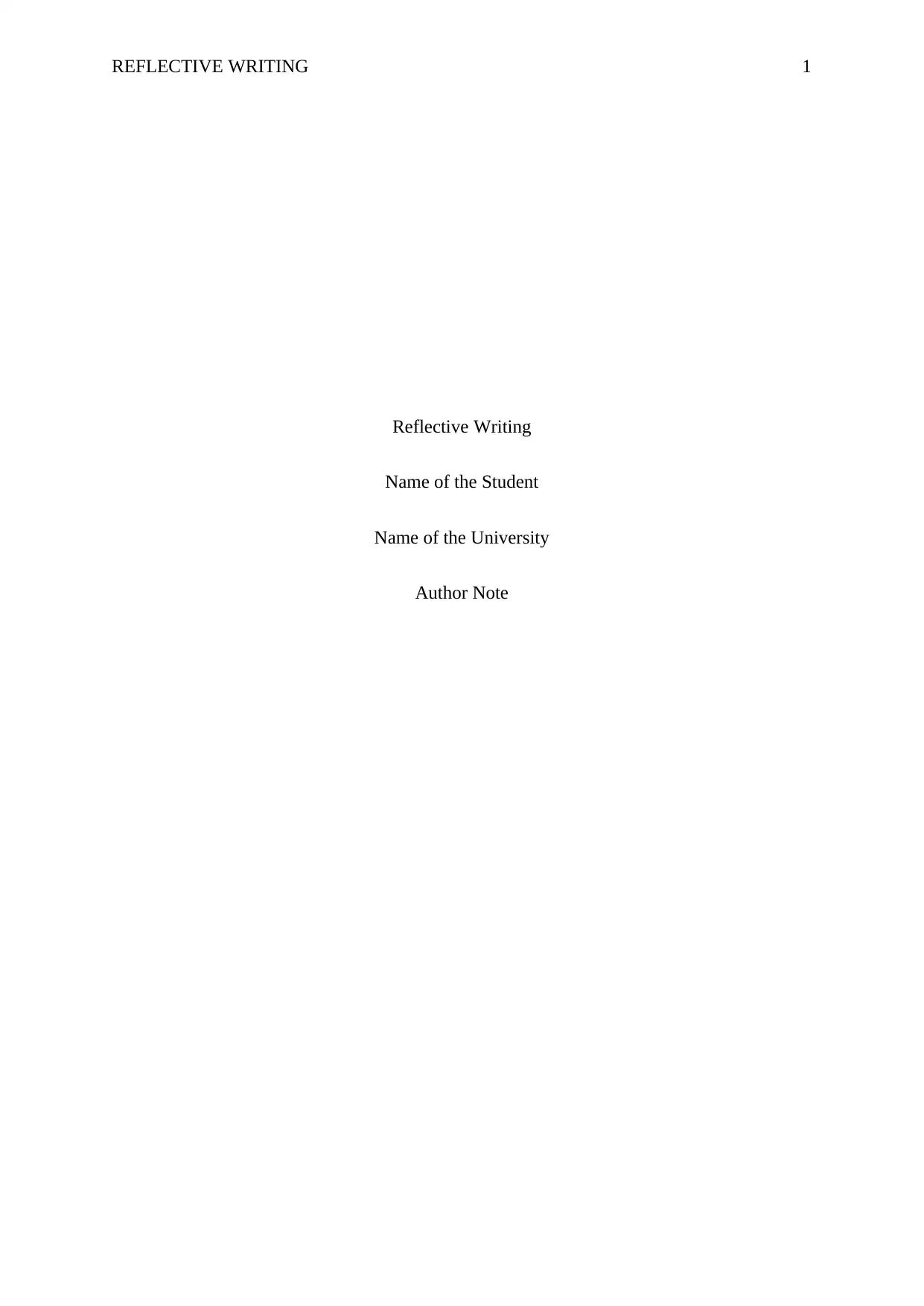
REFLECTIVE WRITING 1
Reflective Writing
Name of the Student
Name of the University
Author Note
Reflective Writing
Name of the Student
Name of the University
Author Note
Paraphrase This Document
Need a fresh take? Get an instant paraphrase of this document with our AI Paraphraser
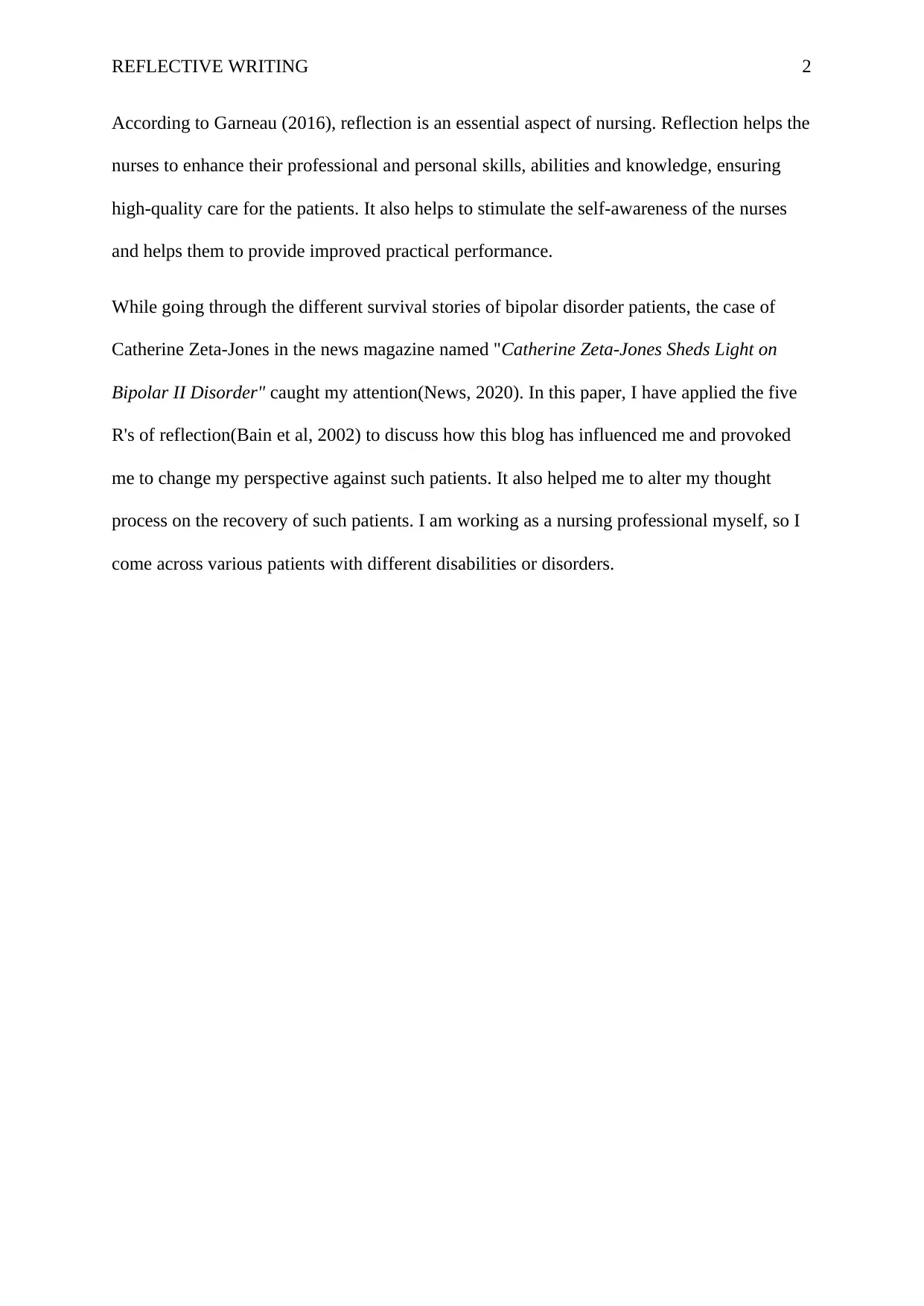
REFLECTIVE WRITING 2
According to Garneau (2016), reflection is an essential aspect of nursing. Reflection helps the
nurses to enhance their professional and personal skills, abilities and knowledge, ensuring
high-quality care for the patients. It also helps to stimulate the self-awareness of the nurses
and helps them to provide improved practical performance.
While going through the different survival stories of bipolar disorder patients, the case of
Catherine Zeta-Jones in the news magazine named "Catherine Zeta-Jones Sheds Light on
Bipolar II Disorder" caught my attention(News, 2020). In this paper, I have applied the five
R's of reflection(Bain et al, 2002) to discuss how this blog has influenced me and provoked
me to change my perspective against such patients. It also helped me to alter my thought
process on the recovery of such patients. I am working as a nursing professional myself, so I
come across various patients with different disabilities or disorders.
According to Garneau (2016), reflection is an essential aspect of nursing. Reflection helps the
nurses to enhance their professional and personal skills, abilities and knowledge, ensuring
high-quality care for the patients. It also helps to stimulate the self-awareness of the nurses
and helps them to provide improved practical performance.
While going through the different survival stories of bipolar disorder patients, the case of
Catherine Zeta-Jones in the news magazine named "Catherine Zeta-Jones Sheds Light on
Bipolar II Disorder" caught my attention(News, 2020). In this paper, I have applied the five
R's of reflection(Bain et al, 2002) to discuss how this blog has influenced me and provoked
me to change my perspective against such patients. It also helped me to alter my thought
process on the recovery of such patients. I am working as a nursing professional myself, so I
come across various patients with different disabilities or disorders.
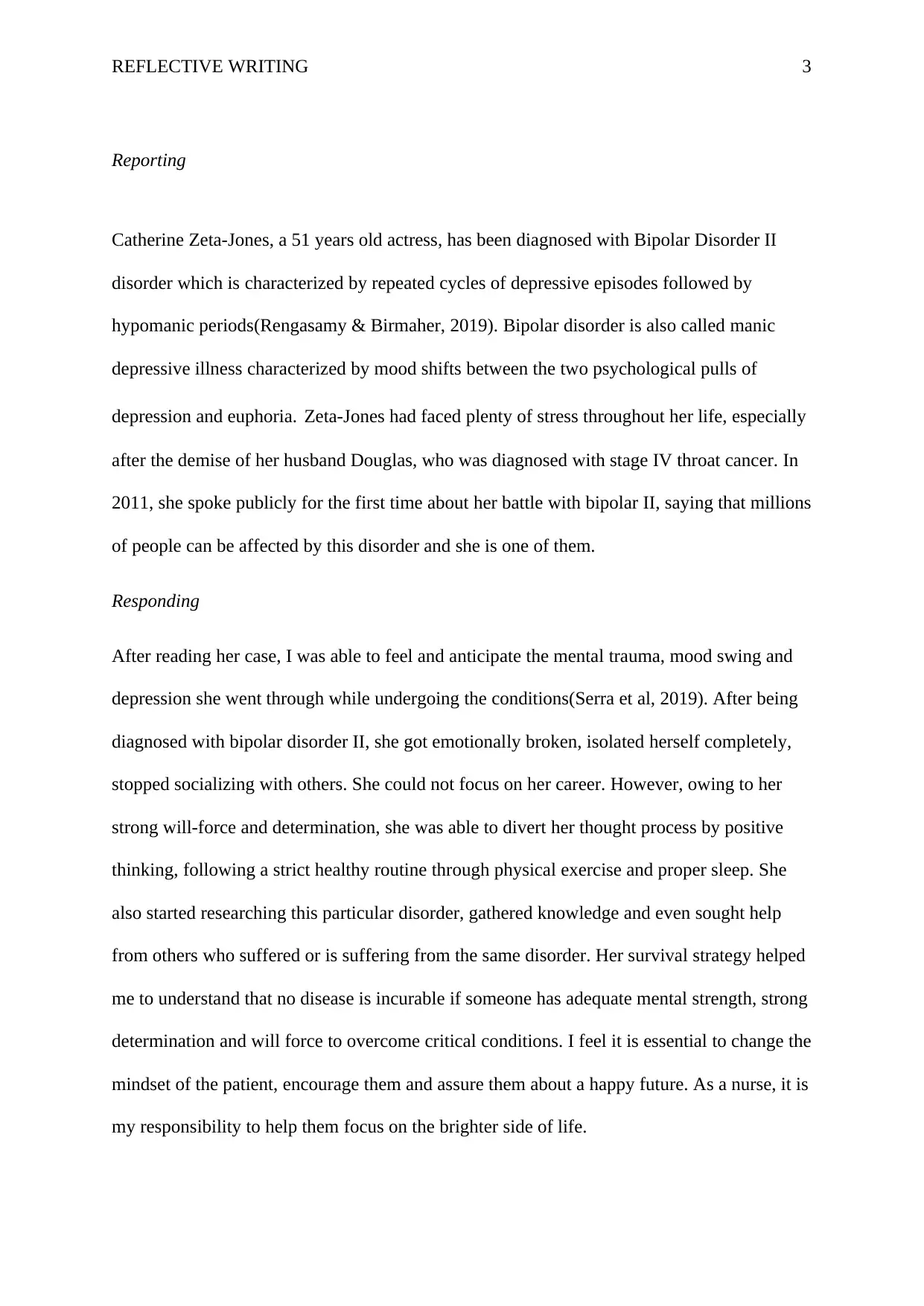
REFLECTIVE WRITING 3
Reporting
Catherine Zeta-Jones, a 51 years old actress, has been diagnosed with Bipolar Disorder II
disorder which is characterized by repeated cycles of depressive episodes followed by
hypomanic periods(Rengasamy & Birmaher, 2019). Bipolar disorder is also called manic
depressive illness characterized by mood shifts between the two psychological pulls of
depression and euphoria. Zeta-Jones had faced plenty of stress throughout her life, especially
after the demise of her husband Douglas, who was diagnosed with stage IV throat cancer. In
2011, she spoke publicly for the first time about her battle with bipolar II, saying that millions
of people can be affected by this disorder and she is one of them.
Responding
After reading her case, I was able to feel and anticipate the mental trauma, mood swing and
depression she went through while undergoing the conditions(Serra et al, 2019). After being
diagnosed with bipolar disorder II, she got emotionally broken, isolated herself completely,
stopped socializing with others. She could not focus on her career. However, owing to her
strong will-force and determination, she was able to divert her thought process by positive
thinking, following a strict healthy routine through physical exercise and proper sleep. She
also started researching this particular disorder, gathered knowledge and even sought help
from others who suffered or is suffering from the same disorder. Her survival strategy helped
me to understand that no disease is incurable if someone has adequate mental strength, strong
determination and will force to overcome critical conditions. I feel it is essential to change the
mindset of the patient, encourage them and assure them about a happy future. As a nurse, it is
my responsibility to help them focus on the brighter side of life.
Reporting
Catherine Zeta-Jones, a 51 years old actress, has been diagnosed with Bipolar Disorder II
disorder which is characterized by repeated cycles of depressive episodes followed by
hypomanic periods(Rengasamy & Birmaher, 2019). Bipolar disorder is also called manic
depressive illness characterized by mood shifts between the two psychological pulls of
depression and euphoria. Zeta-Jones had faced plenty of stress throughout her life, especially
after the demise of her husband Douglas, who was diagnosed with stage IV throat cancer. In
2011, she spoke publicly for the first time about her battle with bipolar II, saying that millions
of people can be affected by this disorder and she is one of them.
Responding
After reading her case, I was able to feel and anticipate the mental trauma, mood swing and
depression she went through while undergoing the conditions(Serra et al, 2019). After being
diagnosed with bipolar disorder II, she got emotionally broken, isolated herself completely,
stopped socializing with others. She could not focus on her career. However, owing to her
strong will-force and determination, she was able to divert her thought process by positive
thinking, following a strict healthy routine through physical exercise and proper sleep. She
also started researching this particular disorder, gathered knowledge and even sought help
from others who suffered or is suffering from the same disorder. Her survival strategy helped
me to understand that no disease is incurable if someone has adequate mental strength, strong
determination and will force to overcome critical conditions. I feel it is essential to change the
mindset of the patient, encourage them and assure them about a happy future. As a nurse, it is
my responsibility to help them focus on the brighter side of life.
⊘ This is a preview!⊘
Do you want full access?
Subscribe today to unlock all pages.

Trusted by 1+ million students worldwide
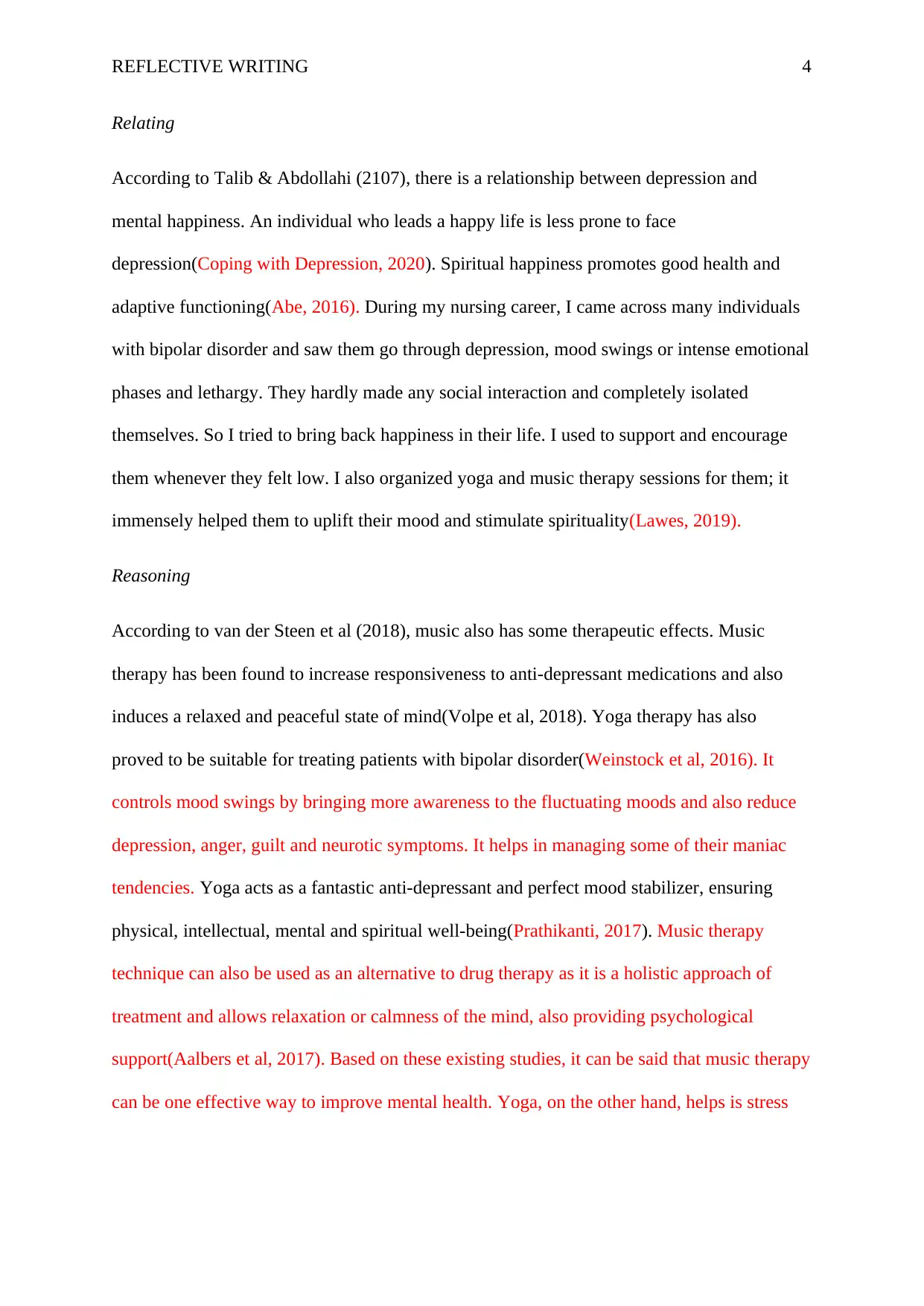
REFLECTIVE WRITING 4
Relating
According to Talib & Abdollahi (2107), there is a relationship between depression and
mental happiness. An individual who leads a happy life is less prone to face
depression(Coping with Depression, 2020). Spiritual happiness promotes good health and
adaptive functioning(Abe, 2016). During my nursing career, I came across many individuals
with bipolar disorder and saw them go through depression, mood swings or intense emotional
phases and lethargy. They hardly made any social interaction and completely isolated
themselves. So I tried to bring back happiness in their life. I used to support and encourage
them whenever they felt low. I also organized yoga and music therapy sessions for them; it
immensely helped them to uplift their mood and stimulate spirituality(Lawes, 2019).
Reasoning
According to van der Steen et al (2018), music also has some therapeutic effects. Music
therapy has been found to increase responsiveness to anti-depressant medications and also
induces a relaxed and peaceful state of mind(Volpe et al, 2018). Yoga therapy has also
proved to be suitable for treating patients with bipolar disorder(Weinstock et al, 2016). It
controls mood swings by bringing more awareness to the fluctuating moods and also reduce
depression, anger, guilt and neurotic symptoms. It helps in managing some of their maniac
tendencies. Yoga acts as a fantastic anti-depressant and perfect mood stabilizer, ensuring
physical, intellectual, mental and spiritual well-being(Prathikanti, 2017). Music therapy
technique can also be used as an alternative to drug therapy as it is a holistic approach of
treatment and allows relaxation or calmness of the mind, also providing psychological
support(Aalbers et al, 2017). Based on these existing studies, it can be said that music therapy
can be one effective way to improve mental health. Yoga, on the other hand, helps is stress
Relating
According to Talib & Abdollahi (2107), there is a relationship between depression and
mental happiness. An individual who leads a happy life is less prone to face
depression(Coping with Depression, 2020). Spiritual happiness promotes good health and
adaptive functioning(Abe, 2016). During my nursing career, I came across many individuals
with bipolar disorder and saw them go through depression, mood swings or intense emotional
phases and lethargy. They hardly made any social interaction and completely isolated
themselves. So I tried to bring back happiness in their life. I used to support and encourage
them whenever they felt low. I also organized yoga and music therapy sessions for them; it
immensely helped them to uplift their mood and stimulate spirituality(Lawes, 2019).
Reasoning
According to van der Steen et al (2018), music also has some therapeutic effects. Music
therapy has been found to increase responsiveness to anti-depressant medications and also
induces a relaxed and peaceful state of mind(Volpe et al, 2018). Yoga therapy has also
proved to be suitable for treating patients with bipolar disorder(Weinstock et al, 2016). It
controls mood swings by bringing more awareness to the fluctuating moods and also reduce
depression, anger, guilt and neurotic symptoms. It helps in managing some of their maniac
tendencies. Yoga acts as a fantastic anti-depressant and perfect mood stabilizer, ensuring
physical, intellectual, mental and spiritual well-being(Prathikanti, 2017). Music therapy
technique can also be used as an alternative to drug therapy as it is a holistic approach of
treatment and allows relaxation or calmness of the mind, also providing psychological
support(Aalbers et al, 2017). Based on these existing studies, it can be said that music therapy
can be one effective way to improve mental health. Yoga, on the other hand, helps is stress
Paraphrase This Document
Need a fresh take? Get an instant paraphrase of this document with our AI Paraphraser
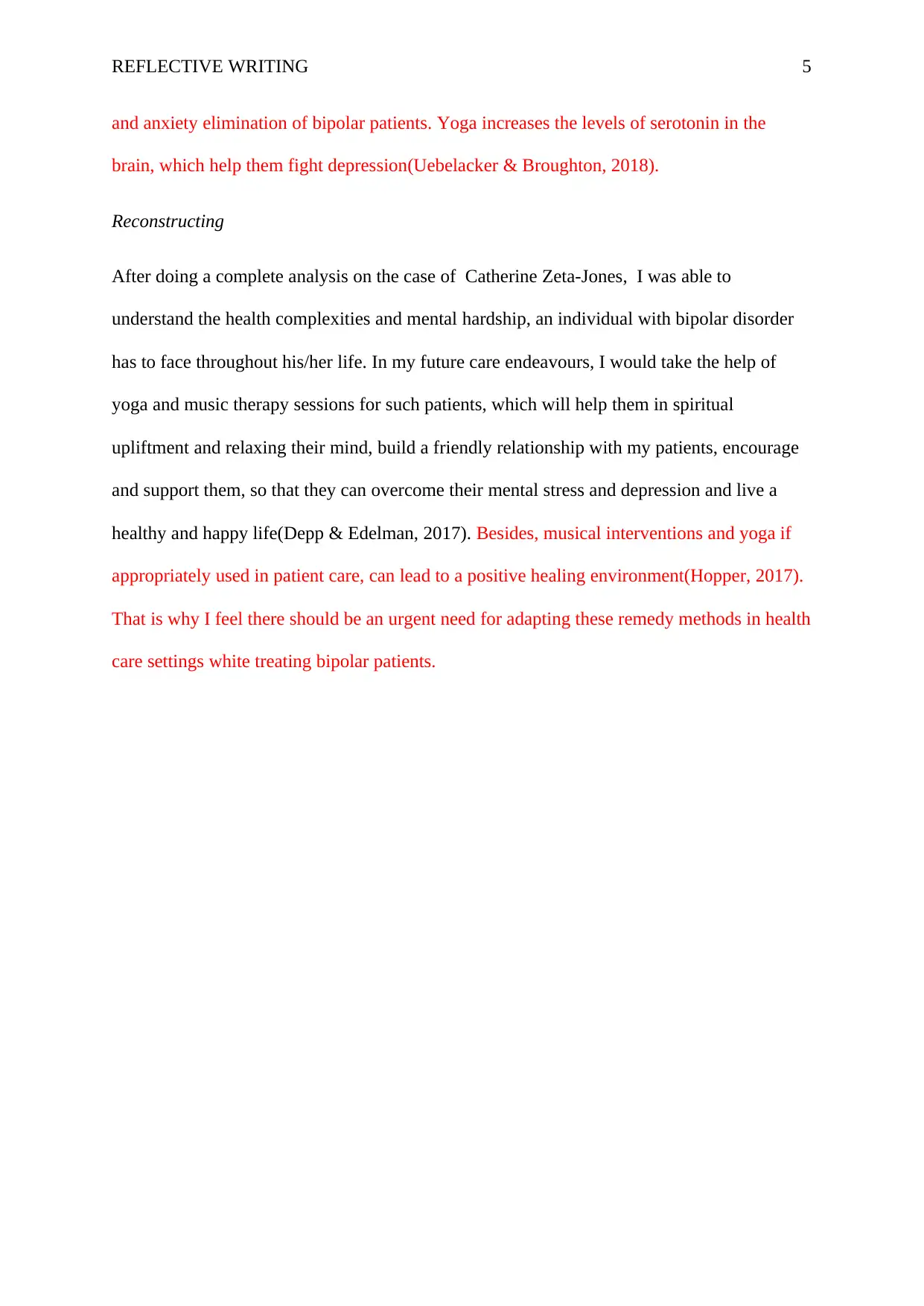
REFLECTIVE WRITING 5
and anxiety elimination of bipolar patients. Yoga increases the levels of serotonin in the
brain, which help them fight depression(Uebelacker & Broughton, 2018).
Reconstructing
After doing a complete analysis on the case of Catherine Zeta-Jones, I was able to
understand the health complexities and mental hardship, an individual with bipolar disorder
has to face throughout his/her life. In my future care endeavours, I would take the help of
yoga and music therapy sessions for such patients, which will help them in spiritual
upliftment and relaxing their mind, build a friendly relationship with my patients, encourage
and support them, so that they can overcome their mental stress and depression and live a
healthy and happy life(Depp & Edelman, 2017). Besides, musical interventions and yoga if
appropriately used in patient care, can lead to a positive healing environment(Hopper, 2017).
That is why I feel there should be an urgent need for adapting these remedy methods in health
care settings white treating bipolar patients.
and anxiety elimination of bipolar patients. Yoga increases the levels of serotonin in the
brain, which help them fight depression(Uebelacker & Broughton, 2018).
Reconstructing
After doing a complete analysis on the case of Catherine Zeta-Jones, I was able to
understand the health complexities and mental hardship, an individual with bipolar disorder
has to face throughout his/her life. In my future care endeavours, I would take the help of
yoga and music therapy sessions for such patients, which will help them in spiritual
upliftment and relaxing their mind, build a friendly relationship with my patients, encourage
and support them, so that they can overcome their mental stress and depression and live a
healthy and happy life(Depp & Edelman, 2017). Besides, musical interventions and yoga if
appropriately used in patient care, can lead to a positive healing environment(Hopper, 2017).
That is why I feel there should be an urgent need for adapting these remedy methods in health
care settings white treating bipolar patients.
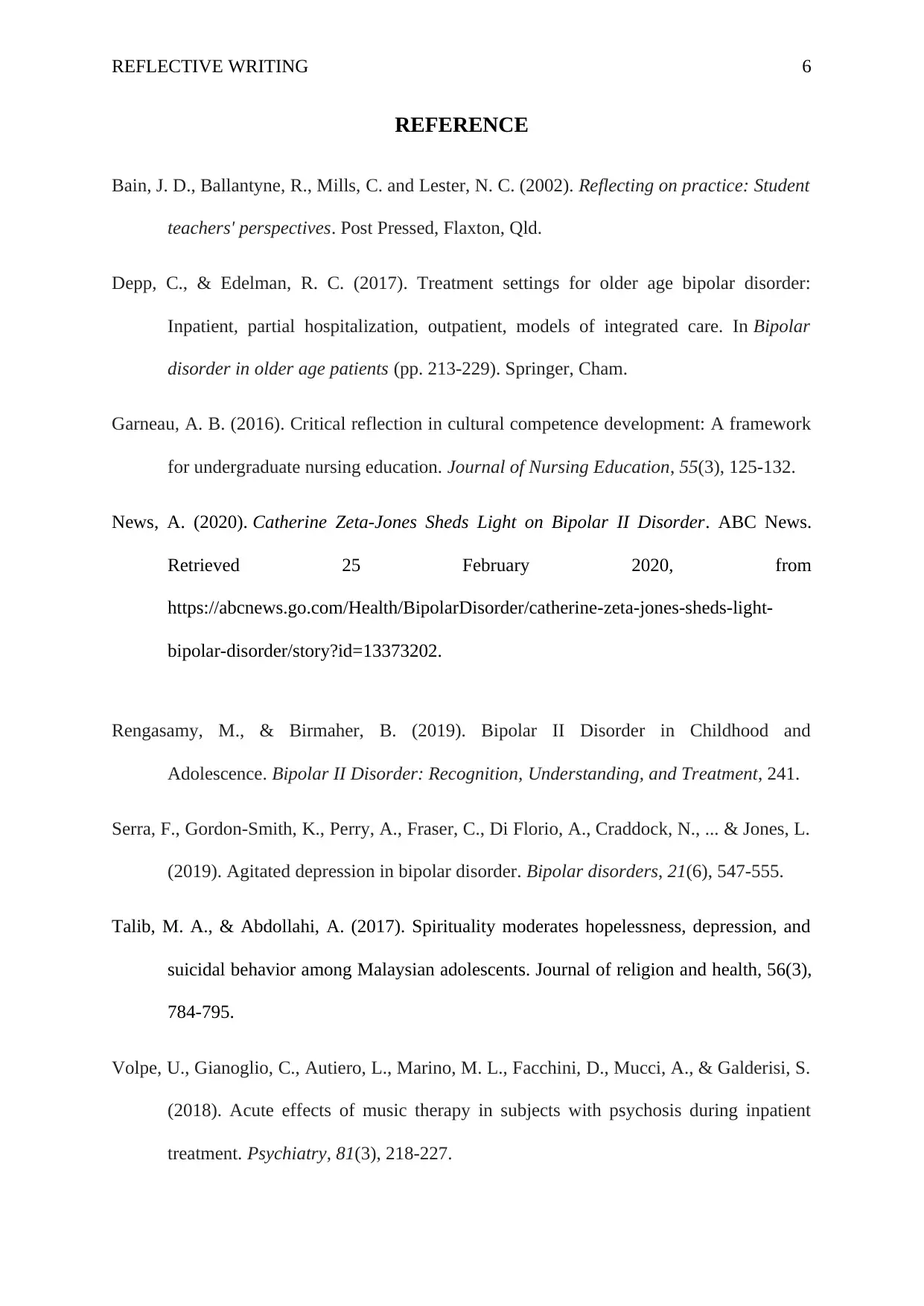
REFLECTIVE WRITING 6
REFERENCE
Bain, J. D., Ballantyne, R., Mills, C. and Lester, N. C. (2002). Reflecting on practice: Student
teachers' perspectives. Post Pressed, Flaxton, Qld.
Depp, C., & Edelman, R. C. (2017). Treatment settings for older age bipolar disorder:
Inpatient, partial hospitalization, outpatient, models of integrated care. In Bipolar
disorder in older age patients (pp. 213-229). Springer, Cham.
Garneau, A. B. (2016). Critical reflection in cultural competence development: A framework
for undergraduate nursing education. Journal of Nursing Education, 55(3), 125-132.
News, A. (2020). Catherine Zeta-Jones Sheds Light on Bipolar II Disorder. ABC News.
Retrieved 25 February 2020, from
https://abcnews.go.com/Health/BipolarDisorder/catherine-zeta-jones-sheds-light-
bipolar-disorder/story?id=13373202.
Rengasamy, M., & Birmaher, B. (2019). Bipolar II Disorder in Childhood and
Adolescence. Bipolar II Disorder: Recognition, Understanding, and Treatment, 241.
Serra, F., Gordon‐Smith, K., Perry, A., Fraser, C., Di Florio, A., Craddock, N., ... & Jones, L.
(2019). Agitated depression in bipolar disorder. Bipolar disorders, 21(6), 547-555.
Talib, M. A., & Abdollahi, A. (2017). Spirituality moderates hopelessness, depression, and
suicidal behavior among Malaysian adolescents. Journal of religion and health, 56(3),
784-795.
Volpe, U., Gianoglio, C., Autiero, L., Marino, M. L., Facchini, D., Mucci, A., & Galderisi, S.
(2018). Acute effects of music therapy in subjects with psychosis during inpatient
treatment. Psychiatry, 81(3), 218-227.
REFERENCE
Bain, J. D., Ballantyne, R., Mills, C. and Lester, N. C. (2002). Reflecting on practice: Student
teachers' perspectives. Post Pressed, Flaxton, Qld.
Depp, C., & Edelman, R. C. (2017). Treatment settings for older age bipolar disorder:
Inpatient, partial hospitalization, outpatient, models of integrated care. In Bipolar
disorder in older age patients (pp. 213-229). Springer, Cham.
Garneau, A. B. (2016). Critical reflection in cultural competence development: A framework
for undergraduate nursing education. Journal of Nursing Education, 55(3), 125-132.
News, A. (2020). Catherine Zeta-Jones Sheds Light on Bipolar II Disorder. ABC News.
Retrieved 25 February 2020, from
https://abcnews.go.com/Health/BipolarDisorder/catherine-zeta-jones-sheds-light-
bipolar-disorder/story?id=13373202.
Rengasamy, M., & Birmaher, B. (2019). Bipolar II Disorder in Childhood and
Adolescence. Bipolar II Disorder: Recognition, Understanding, and Treatment, 241.
Serra, F., Gordon‐Smith, K., Perry, A., Fraser, C., Di Florio, A., Craddock, N., ... & Jones, L.
(2019). Agitated depression in bipolar disorder. Bipolar disorders, 21(6), 547-555.
Talib, M. A., & Abdollahi, A. (2017). Spirituality moderates hopelessness, depression, and
suicidal behavior among Malaysian adolescents. Journal of religion and health, 56(3),
784-795.
Volpe, U., Gianoglio, C., Autiero, L., Marino, M. L., Facchini, D., Mucci, A., & Galderisi, S.
(2018). Acute effects of music therapy in subjects with psychosis during inpatient
treatment. Psychiatry, 81(3), 218-227.
⊘ This is a preview!⊘
Do you want full access?
Subscribe today to unlock all pages.

Trusted by 1+ million students worldwide
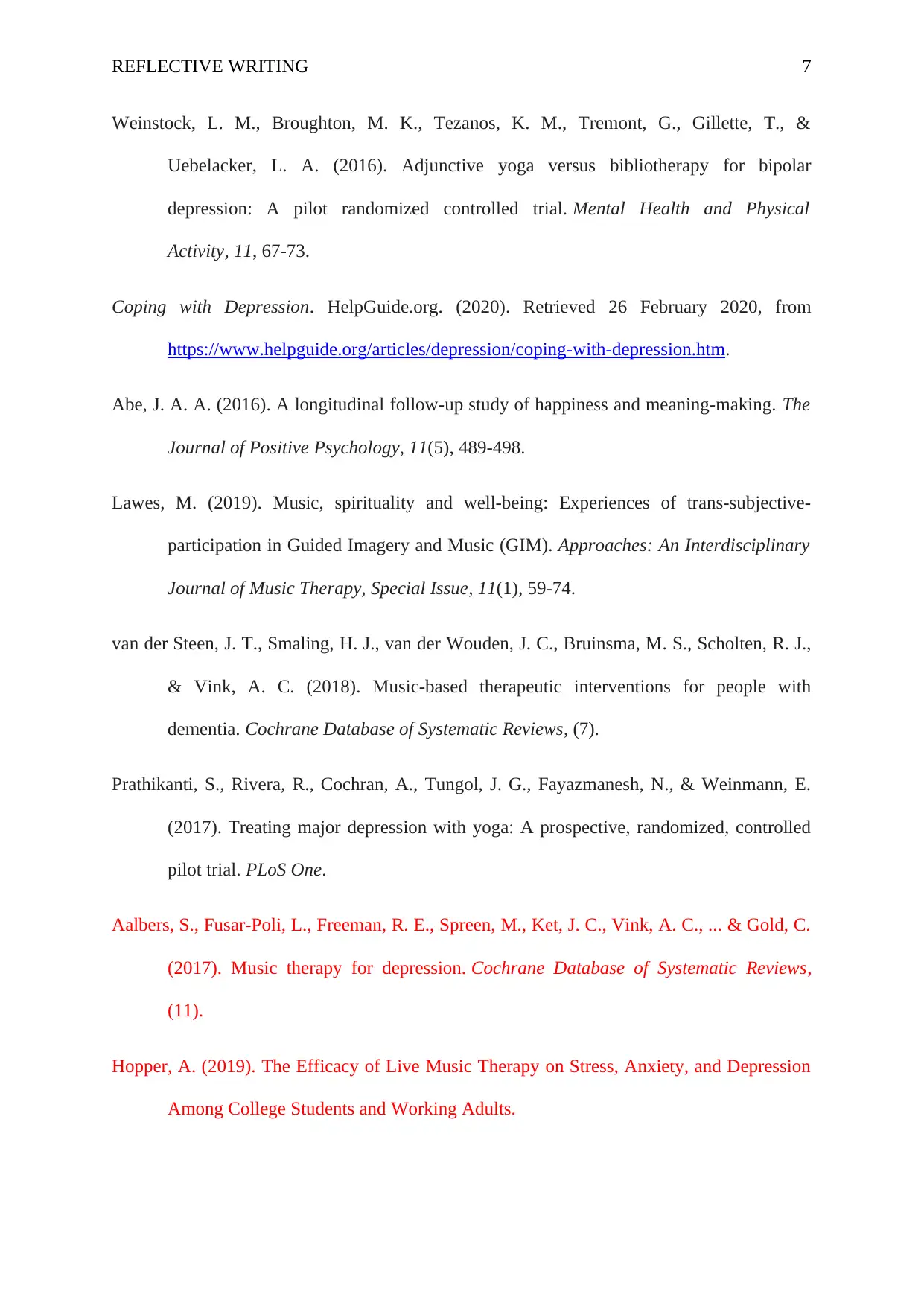
REFLECTIVE WRITING 7
Weinstock, L. M., Broughton, M. K., Tezanos, K. M., Tremont, G., Gillette, T., &
Uebelacker, L. A. (2016). Adjunctive yoga versus bibliotherapy for bipolar
depression: A pilot randomized controlled trial. Mental Health and Physical
Activity, 11, 67-73.
Coping with Depression. HelpGuide.org. (2020). Retrieved 26 February 2020, from
https://www.helpguide.org/articles/depression/coping-with-depression.htm.
Abe, J. A. A. (2016). A longitudinal follow-up study of happiness and meaning-making. The
Journal of Positive Psychology, 11(5), 489-498.
Lawes, M. (2019). Music, spirituality and well-being: Experiences of trans-subjective-
participation in Guided Imagery and Music (GIM). Approaches: An Interdisciplinary
Journal of Music Therapy, Special Issue, 11(1), 59-74.
van der Steen, J. T., Smaling, H. J., van der Wouden, J. C., Bruinsma, M. S., Scholten, R. J.,
& Vink, A. C. (2018). Music‐based therapeutic interventions for people with
dementia. Cochrane Database of Systematic Reviews, (7).
Prathikanti, S., Rivera, R., Cochran, A., Tungol, J. G., Fayazmanesh, N., & Weinmann, E.
(2017). Treating major depression with yoga: A prospective, randomized, controlled
pilot trial. PLoS One.
Aalbers, S., Fusar‐Poli, L., Freeman, R. E., Spreen, M., Ket, J. C., Vink, A. C., ... & Gold, C.
(2017). Music therapy for depression. Cochrane Database of Systematic Reviews,
(11).
Hopper, A. (2019). The Efficacy of Live Music Therapy on Stress, Anxiety, and Depression
Among College Students and Working Adults.
Weinstock, L. M., Broughton, M. K., Tezanos, K. M., Tremont, G., Gillette, T., &
Uebelacker, L. A. (2016). Adjunctive yoga versus bibliotherapy for bipolar
depression: A pilot randomized controlled trial. Mental Health and Physical
Activity, 11, 67-73.
Coping with Depression. HelpGuide.org. (2020). Retrieved 26 February 2020, from
https://www.helpguide.org/articles/depression/coping-with-depression.htm.
Abe, J. A. A. (2016). A longitudinal follow-up study of happiness and meaning-making. The
Journal of Positive Psychology, 11(5), 489-498.
Lawes, M. (2019). Music, spirituality and well-being: Experiences of trans-subjective-
participation in Guided Imagery and Music (GIM). Approaches: An Interdisciplinary
Journal of Music Therapy, Special Issue, 11(1), 59-74.
van der Steen, J. T., Smaling, H. J., van der Wouden, J. C., Bruinsma, M. S., Scholten, R. J.,
& Vink, A. C. (2018). Music‐based therapeutic interventions for people with
dementia. Cochrane Database of Systematic Reviews, (7).
Prathikanti, S., Rivera, R., Cochran, A., Tungol, J. G., Fayazmanesh, N., & Weinmann, E.
(2017). Treating major depression with yoga: A prospective, randomized, controlled
pilot trial. PLoS One.
Aalbers, S., Fusar‐Poli, L., Freeman, R. E., Spreen, M., Ket, J. C., Vink, A. C., ... & Gold, C.
(2017). Music therapy for depression. Cochrane Database of Systematic Reviews,
(11).
Hopper, A. (2019). The Efficacy of Live Music Therapy on Stress, Anxiety, and Depression
Among College Students and Working Adults.
Paraphrase This Document
Need a fresh take? Get an instant paraphrase of this document with our AI Paraphraser
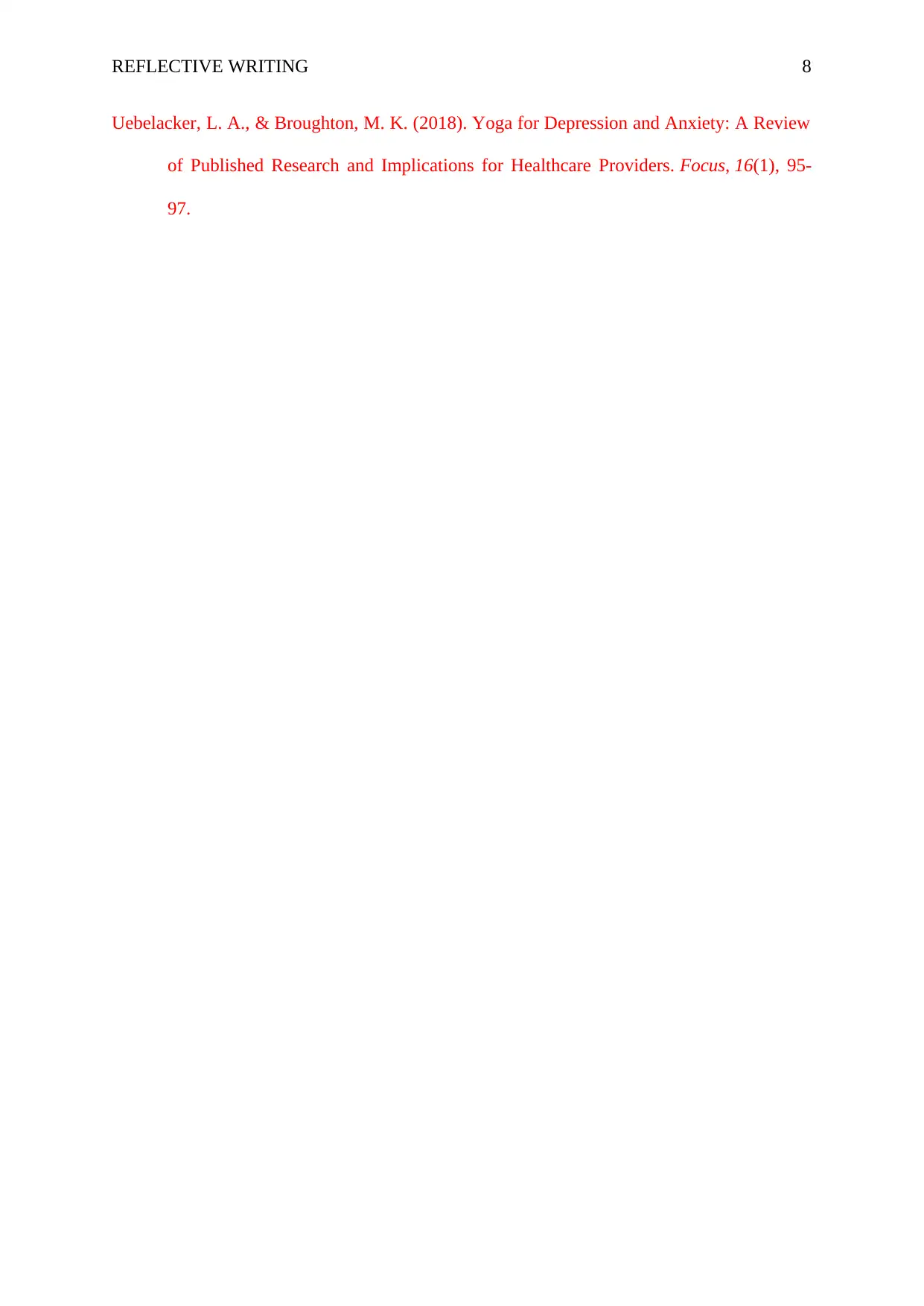
REFLECTIVE WRITING 8
Uebelacker, L. A., & Broughton, M. K. (2018). Yoga for Depression and Anxiety: A Review
of Published Research and Implications for Healthcare Providers. Focus, 16(1), 95-
97.
Uebelacker, L. A., & Broughton, M. K. (2018). Yoga for Depression and Anxiety: A Review
of Published Research and Implications for Healthcare Providers. Focus, 16(1), 95-
97.
1 out of 8
Related Documents
Your All-in-One AI-Powered Toolkit for Academic Success.
+13062052269
info@desklib.com
Available 24*7 on WhatsApp / Email
![[object Object]](/_next/static/media/star-bottom.7253800d.svg)
Unlock your academic potential
Copyright © 2020–2026 A2Z Services. All Rights Reserved. Developed and managed by ZUCOL.





